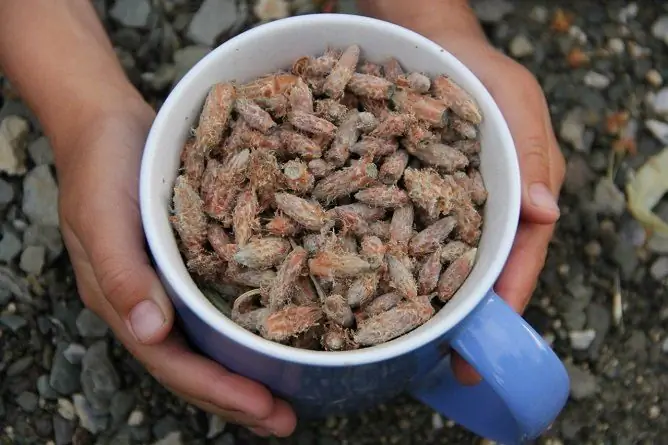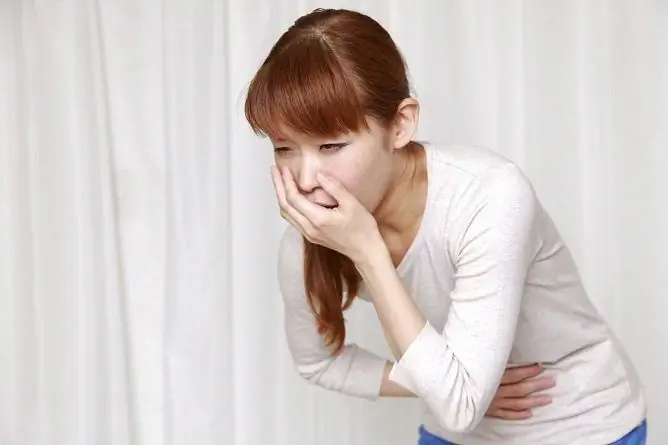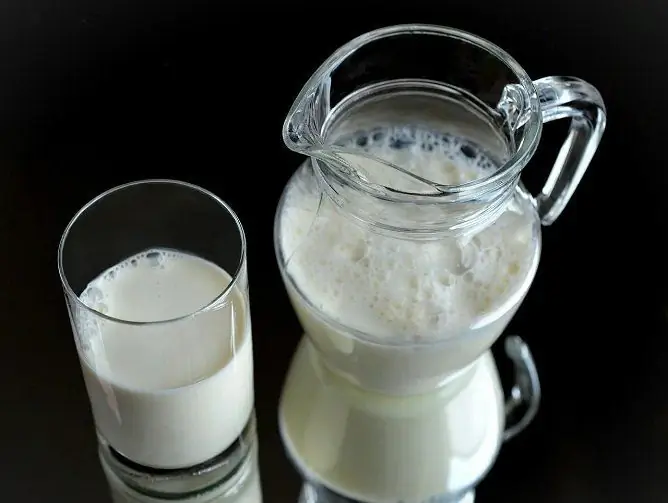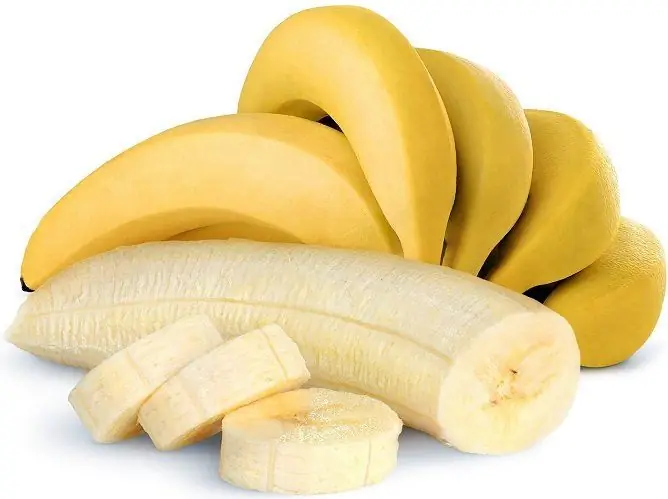- Author Rachel Wainwright wainwright@abchealthonline.com.
- Public 2023-12-15 07:39.
- Last modified 2025-11-02 20:14.
Pine buds for cough: recipes for children and adults, indications and contraindications
The content of the article:
- Composition and benefits of pine buds
- How to properly prepare plant materials
- Pine bud syrup
- How to brew pine buds for a cough
- Pine bud honey for children
- Pine buds for cough: inhalation recipe
- Indications and contraindications for the use of pine buds for the treatment of cough
- Video
One of the most effective folk methods is the use of pine buds for coughing.
In the off-season and winter periods, the incidence of respiratory diseases increases sharply, one of the main symptoms of which is dry or wet cough. The pharmacy has a fairly large assortment of antitussive drugs, but at the same time, the remedies recommended by traditional medicine have not lost their relevance.

Pine buds are a potent drug when used correctly
Composition and benefits of pine buds
The medicinal properties of conifers are well known. It is not for nothing that most of the sanatoriums specializing in the treatment of diseases of the bronchopulmonary system are located in pine forests. Pine and spruce trees contain large amounts of resins and essential oils, which determine the specific aroma of the coniferous forest. The same substances have a beneficial effect on the state of the respiratory system.
Young pine buds contain in large quantities:
- alkaloids;
- tannins;
- phytoncides - biologically active substances that have a destructive effect on various pathogenic microorganisms (bacteria, fungi, protozoa, viruses);
- saponins;
- essential oils;
- B vitamins and ascorbic acid;
- pinicycrine.
The mechanism of the therapeutic action of pine kidneys for coughing includes:
- suppression of the vital activity of bacteria and viruses;
- improvement of the motor function of the cilia of the ciliated epithelium;
- stimulation of the regeneration of cells of the bronchial mucosa;
- increased general and local immunity.
According to reviews, pine buds provide a quick healing effect. The medicinal substances contained in them help to eliminate even a very strong cough in children and adults. However, it should be understood that cough itself is not an independent disease. This is just a symptom that is most often observed in diseases of the respiratory system (tracheitis, bronchitis, pneumonia, bronchial asthma). But sometimes a cough can also occur with diseases of the gastrointestinal tract, for example, with reflux esophagitis or the nervous system (neurogenic cough). Therefore, any expectorants, including pine buds, should be used only as part of the complex therapy of the underlying disease prescribed by the doctor.
How to properly prepare plant materials
You can buy pine buds at almost any pharmacy, but if you wish, you can prepare plant materials yourself. When assembling, observe the following rules:
- The pine forest is supposed to be located in an ecologically clean place, away from hazardous industries and major highways. Only in this case can you be sure that the kidneys will not contain toxic substances, for example, heavy metal salts.
- Pine buds should be collected in early spring on a sunny day. It is at this time that the content of nutrients in them reaches its maximum.
- The collected buds should be dried slowly, out of direct sunlight. To do this, the raw material is sprinkled on a clean cotton cloth in a thin layer and dried in a well-ventilated room for about 20 days (if the kidneys break inside, they should remain dry). Do not use a microwave oven, electric dryer or oven for drying, as when heated, essential oils will evaporate from the kidneys, and they will lose their healing power.
Dried pine buds are used to prepare a decoction for inhalation or ingestion. Fresh buds can be used to make an effective antitussive syrup.
Pine bud syrup
The syrup is based on fresh pine buds. They must be rinsed under running water, and then twisted through a meat grinder. The resulting gruel is poured into a three-liter container and 1.5 cups of honey are added. With individual intolerance to beekeeping products, honey is replaced with the same volume of granulated sugar. Insist in a dry place until the syrup acquires a characteristic brown color. It should be filtered through a fine sieve or gauze folded in several layers, carefully squeezing out the remaining cake.
The prepared syrup is stored in a cool, dark place. Apply three times a day half an hour before meals in the dose prescribed by the doctor. If desired, it can be added to milk, tea or herbal decoction.
Using a similar recipe, you can make pine cones cough syrup, in this case, instead of the kidneys, take young pine cones, which are poured with honey and then prepared in the same way as the kidney syrup.
Antitussive syrup from pine buds is especially convenient to procure and take for people who often suffer from respiratory diseases.

If pine buds are not available, medicated syrup can be made from young cones.
How to brew pine buds for a cough
Put 10 g of pine buds in a small enamel pot and pour a glass of cold water. Bring to a boil and simmer under a closed lid for 10 minutes. Insist 2 hours. Strain and add boiled water to the original volume. Adults should use the resulting broth for a tablespoon 3-4 times a day as an effective expectorant. In children, the use of a decoction of pine buds is possible only in consultation with the attending physician.
Pine bud honey for children
Young children are often reluctant to take medication, one of which makes them feel bad. Parents need to have a lot of patience in order to persuade a child to drink a particular drug.
Healing honey can be prepared from pine buds, which will have a good taste and at the same time is a very effective expectorant.
To prepare it, pour two glasses of fresh pine buds with a liter of cold water and leave in the kitchen to infuse overnight. In the morning, the infusion is brought to a boil and cooked for 2-3 minutes. Cool and filter through 2-3 layers of gauze, carefully squeezing the raw material. Top up with warm boiled water until the volume is restored to 1 liter. Add a kilogram of granulated sugar and cook over very low heat until thickened (about an hour). At the very end, add 1-2 tablespoons of freshly squeezed lemon juice to honey.
Pine buds for cough: inhalation recipe
Put 3 tablespoons of pine buds in a saucepan and pour half a liter of boiling water. For the best effect, you can add a teaspoon of thyme, sage, eucalyptus leaves to the infusion.
For inhalation, the infusion should be cooled to 60 ° C. The patient should bend over the pan and cover his head with a towel. Inhale the vapor through a wide open mouth. The duration of the procedure is 5-10 minutes. You can repeat it 2-3 times a day.

A decoction of pine buds is an excellent remedy for inhalation
Indications and contraindications for the use of pine buds for the treatment of cough
Pine buds can be used in the complex therapy of a number of diseases:
- acute respiratory viral infections (colds);
- pharyngitis;
- tracheitis;
- bronchitis;
- pneumonia;
- tuberculosis;
- bronchial asthma.
But there are a number of contraindications to the use of pine buds. These include:
- individual intolerance (allergy);
- pregnancy and lactation;
- acute and chronic glomerulonephritis;
- chronic hepatitis;
- increased blood clotting;
- thrombophlebitis;
- varicose veins of the lower extremities.
When treating cough with pine buds, the indicated dosages and norms should be very carefully observed, since this type of plant material contains a significant amount of a large amount of biologically active substances. An overdose of herbal remedies based on pine buds can cause:
- deterioration in general health;
- inflammation of the renal parenchyma;
- acute gastritis;
- severe headache.
Video
We offer for viewing a video on the topic of the article.

Elena Minkina Doctor anesthesiologist-resuscitator About the author
Education: graduated from the Tashkent State Medical Institute, specializing in general medicine in 1991. Repeatedly passed refresher courses.
Work experience: anesthesiologist-resuscitator of the city maternity complex, resuscitator of the hemodialysis department.
Found a mistake in the text? Select it and press Ctrl + Enter.






